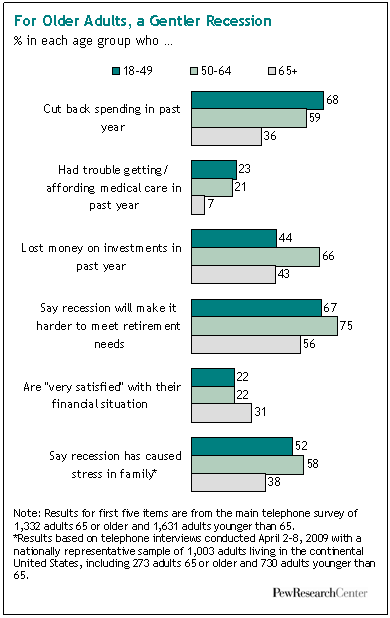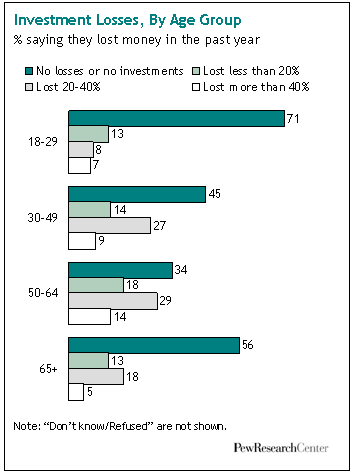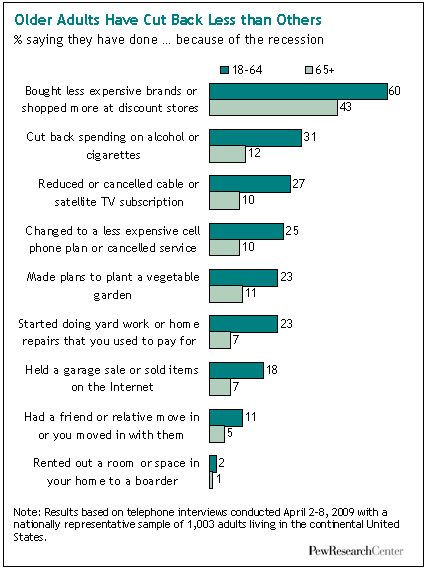I. Overview
The ongoing recession has had different impacts on different age groups in America. Adults 65 and older — most of whom have already retired and downsized their lifestyles — have escaped its full fury. Adults in late middle age (50 to 64) have seen their nest eggs shrink the most and their anxieties about retirement swell the most. Younger adults (ages 18-49) have taken the worst lumps in the job market but remain relatively upbeat about their financial future.

These are the main findings of telephone survey of a nationally representative sample of 2,969 adults conducted by the Pew Research Center’s Social & Demographic Trends project from Feb. 23 to March 23, 2009.1
The most compelling story to emerge from the survey is that older adults are living through what for them has been a kinder, gentler recession — relatively speaking. They are less likely than younger and middle-aged adults to say that in the past year they have cut back on spending; suffered losses in their retirement accounts; or experienced trouble paying for housing or medical care. They’re more likely to report being very satisfied with their personal finances. And they’re less likely to say the recession has been a source of stress in their family.
Moreover, despite the recession, three-quarters say they expect to be able to leave an inheritance for their children — even though more than half of all older adults say the recession has reduced the amount of money or property they expect to bequeath.
By contrast, adults ages 50-64 are living through what feels to them like much harder times. Three-quarters of this so-called Threshold Generation say that the nation’s current economic problems will make it more difficult for them to afford retirement. Two-thirds of younger adults and 56% of older adults share the same concern.

One reason that late-middle-aged adults feel so vulnerable is that their nest eggs have taken the brunt of Wall Street’s meltdown. Two-thirds of adults ages 50-64 say they lost money in the past year in mutual funds, individual stocks or 401(k)-type retirement accounts. Of those who report such losses, two-in-ten say they lost more than 40% of their investments’ value and nearly four-in-ten say they lost 20% to 40%. By comparison, far fewer older adults or younger adults report losing money in stocks and retirement accounts in the past year.
When it comes to specific changes in behavior triggered by the recession, there are also notable differences by age. Fully 60% of all younger and middle-aged adults say they are doing more shopping at discount stores or avoiding more expensive brands, compared with just 43% of adults 65 or older. Those under age 65 are more than twice as likely as older adults to have cut down on spending on alcohol or cigarettes (31% vs. 12%) or reduced spending on cable service (27% vs. 10%). And nearly a quarter of younger adults say they plan to plant a “recession garden” to cut their food bills, about double the proportion of older adults who anticipate taking this step (23% vs. 11%).
One caveat about these reported behavioral changes: Some individuals may have changed their behaviors prior to the recession (for example, shopping in discount stores). Others may never have engaged in the behavior in the first place (for example, owning a cell phone). Taken together, these factors probably account for some of the disparities by age found in this battery of questions.
Recession and Race

Race and ethnicity play out differently among different age groups. Blacks and Hispanics ages 65 and older are significantly more likely than similarly aged whites to say that in the past year they have cut back on household spending or have had problems obtaining or paying for medical care.
Yet these racial and ethnic disparities largely vanish among younger generations of blacks, whites and Hispanics on many key questions. For example, 34% of all older whites but 42% of older blacks report they cut back on household spending the past year because money was tight — an eight-point gap. For Hispanics, the gap is larger: 11 points. But among those younger than 65, these differences disappear: about two-thirds of all whites (65%), blacks (65%) and Hispanics (64%) say they have trimmed spending in the past year. For younger adults, these data suggest that the recession may be colorblind.
Not surprisingly, income plays a major role in how hard people have been hit during the recession — and this holds true across all age groups. Three-quarters of all adults with family incomes below $30,000 say they have cut back household spending in the past year, compared with 58% of those earning $75,000 or more. The median annual income of older adults is smaller than that of other age groups, but the pattern is the same: Older adults whose family income is less than $20,000 a year are more than twice as likely as older adults whose income is $50,000 or more to have cut spending (57% vs. 22%).
The survey also finds a sharp inheritance expectations gap between older adults and their adult children. About three-quarters of all adults 65 or older say they plan to leave an inheritance to children or family members. By contrast, less than half (43%) of all adult children with older parents say they expect to receive an inheritance.
About the Survey
Most of the results cited in this report are from a telephone survey conducted with a nationally representative nationally representative sample of 2,969 adults living in the continental United States. In addition, oversamples of adults 65 and older as well as blacks and Hispanics were obtained. The black and Hispanic oversamples were achieved by oversampling landline exchanges with more black and Hispanic residents as well as callbacks to blacks and Hispanics interviewed in previous surveys. A total of 2,417 interviews were completed with respondents contacted by landline telephone and 552 from those contacted on their cellular phone. The data are weighted to produce a final sample that is representative of the general population of adults in the continental United States.
- Interviews conducted Feb. 23-March 23, 2009
- There were 2,969 interviews, including 1,332 with respondents 65 or older. The older respondents included 799 whites, 293 blacks and 161 Hispanics.
- Margin of sampling error is plus or minus 2.6 percentage points for results based on the total sample at the 95% confidence level.
- For data reported by race or ethnicity, margin of sampling error is plus or minus 3.5 percentage points for sample of older whites, plus or minus 7.4 percentage points for older blacks and plus or minus 10.3 percentage points for older Hispanics.
- Note on terminology: Whites include only non-Hispanic whites. Blacks include only non-Hispanic blacks. Hispanics are of any race.
Additional findings cited in this report are from a second telephone survey conducted April 2-8, 2009, with a nationally representative sample of 1,003 adults living in the continental United states. Margin of sampling error is plus or minus 3.6 percentage points for results based on this total sample at a 95% confidence level. A combination of landline and cellular random digit dial (RDD) samples was used to cover all adults in the continental United States who have access to either a landline or cellular telephone. A total of 752 interviews were completed with respondents contacted by landline phone and 251 with those contacted on their cell phone. The data are weighted to produce a final sample that is representative of the general population of adults in the continental United States.
Interviews for both surveys conducted under direction of Princeton Survey Research Associates International.




